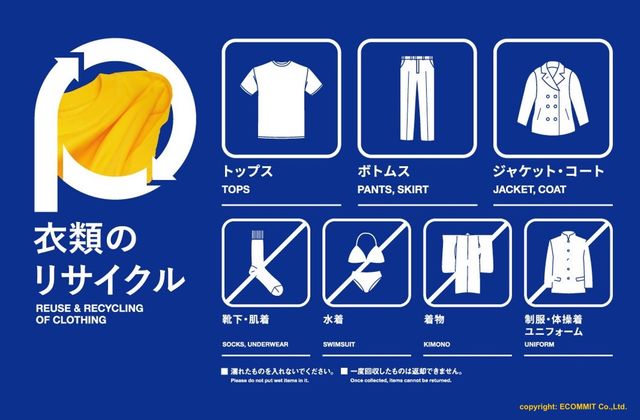Fashion, clothing and textiles
What is it? Circos is an online platform that offers a subscription service for high-quality children's and maternity wear. Children grow out of their clothes quickly; this service allows parents to swap for larger sized items conveniently and sustainably. This method increases the use and prolongs the lifetime of clothes. Additionally, worn items can be returned to Circos for material repurpose (Circos, 2021a).
Why is this important? The fashion industry is the second-largest polluter in the world. It accounts for 10% of global carbon emissions (McFall-Johnsen, 2021). The garment manufacturing process also requires a large quantity of water. For example, the dyeing and finishing process of clothes can take up to 200 tons of freshwater per ton of dyed fabric (McFall-Johnsen, 2021). The current linear system means that the majority of clothes end up in landfill, resulting in 13 million tons of textiles waste each year (Ellen MacArthur Foundation, 2017). For instance, a typical Western family throws away 30kg of clothing each year and only 15% is recycled or donated (Ellen MacArthur Foundation, 2017). Children's clothing creates significant waste as they grow out of their clothes quickly. Most children's clothes are only worn for a maximum of 2 or 3 months (Circos, 2021b). On average, parents use 280 pieces of child's clothing in the first two years after their child is born (Circos, 2021b).
Main resource strategy:
Slowing the loop by extending the lifetime of children's and maternity clothes by keeping it in use for longer.
Other resource strategies:
Narrowing the loop through carbon negative shipping by using plant-based, biodegradable and compostable mailers and are (Circos, 2021c).
Closing the loop by repurposing worn clothes returned to Circos.
Business model aspects:
- Value Proposition: Customers can access high-quality children's and maternity clothes with a monthly subscription.
- Value Creation & Delivery: The subscription model allows customers to access an extensive catalogue of children's clothes from different brands at a fraction of cost. Worn clothes are recycled to make other products.
- Value Capture: Circos charges subscription from EUR 19.5 per month. The price varies with the individual pricing of items selected by the customers (Circos, 2021d)
Business model experimentation practices:
The Circos founding team helped launch VIGGA in Denmark, the world's first kids clothing subscription in 2015. They launched Circos to the Dutch market in 2019 based on the knowledge acquired and network built from that experience.
Marketing company Direct Impact helped Circos to set up a multichannel launch campaign to maximize exposure and boost lead generation. Using the lean startup approach, it worked with Circos to align the product and website with the customer needs (Direct Impact, 2021).
In January 2021, H&M owned brand Arket has announced its partnership with Circos to rent out its line of children’s clothes on the platform (Chin, 2021).
Tools, methods and approaches used:
A Life Cycle Assessment (LCA) was conducted by the Danish consultancy firm PlanMiljø in 2019 to determine the sustainability impacts (Circos, 2021c).
Sustainability outcomes:
An LCA conducted in 2019 showed that customers could save on average 242 litres of water, 260 grams of cotton, and 6 kilos of CO2 emissions per month (Circos, 2021c).
Sources:
Chin, M. (2021). ARKET is now renting out its childrenswear. Setting Mind. Accessed 3 February 2021 at: https://settingmind.com/arket-is-now-renting-out-its-childrenswear/
Circos. (2021a). About Circos. Accessed 2 February 2021 at: https://circos.co/about/
Circos. (2021b). Our Story. Accessed 2 February 2021 at: https://circos.co/about/affordable/
Circos (2021c). Sustainable. Accessed 2 February 2021 at: https://circos.co/about/sustainable/
Circos. (2021d). Affordable. Accessed 2 February 2021 at: https://circos.co/about/affordable/
Direct Impact (2021). The first European wide clothing subscription for kids and pregnant mothers. Accessed 4 February 2021 at: https://www.directimpact.online/ecommerce/the-first-european-wide-clothing-subscription-for-kids-and-pregnant-mothers/
Ellen MacArthur Foundation (2017). A new textiles economy: Redesigning fashion's future. Accessed 25 November 2020 at: https://www.ellenmacarthurfoundation.org/publications/a-new-textiles-economy-redesigning-fashions-future.
McFall-Johnsen, M. (2021). These facts show how unsustainable the fashion industry is. World Economic Forum. Accessed 3 February 2021 at: https://www.weforum.org/agenda/2020/01/fashion-industry-carbon-unsustainable-environment-pollution/#:~:text=Fashion%20production%20makes%20up%2010,to%20the%20dump%20each%20year.&text=Here%20are%20the%20most%20significant,has%20roughly%20doubled%20since%202000.
***
About project Circular X
Project Circular X is about 'Experimentation with Circular Service Business Models'. It is an ambitious research project funded by the European Research Council (ERC) which supports top researchers from anywhere in the world. Project CIRCULAR X runs from 2020-2025. The project is led by Principal Investigator (PI) Prof Dr Nancy Bocken, who is joined by a multidisciplinary team of researchers at Maastricht Sustainability Institute (MSI), Maastricht School of Business and Economics, Maastricht University. The project cooperates with businesses who want to innovate towards the circular economy.
Project Circular X addresses a new and urgent issue: experimentation with circular service business models (CSBMs). Examples of such new business models include companies shifting from selling products to selling services and introducing lifelong warrantees to extend product lifetimes. However, CSBMs are far from mainstream and research focused on experimentation is little understood. The research aims to conduct interdisciplinary research with 4 objectives:
- Advancing understanding of CSBMs; their emergence and impacts
- Advancing knowledge on CSBM experimentation
- Developing CSBM experimentation tools
- Designing and deploying CSBM experimentation labs
Funding source
This project has received funding from the European Research Council (ERC) under the European Union's Horizon 2020 research and innovation programme, grant agreement No. 850159.
Using of this information
When you refer to this case, please use the following source:
Circular X. (2021) Case study: Circos clothing subscription. Accessed from www.circularx.eu



